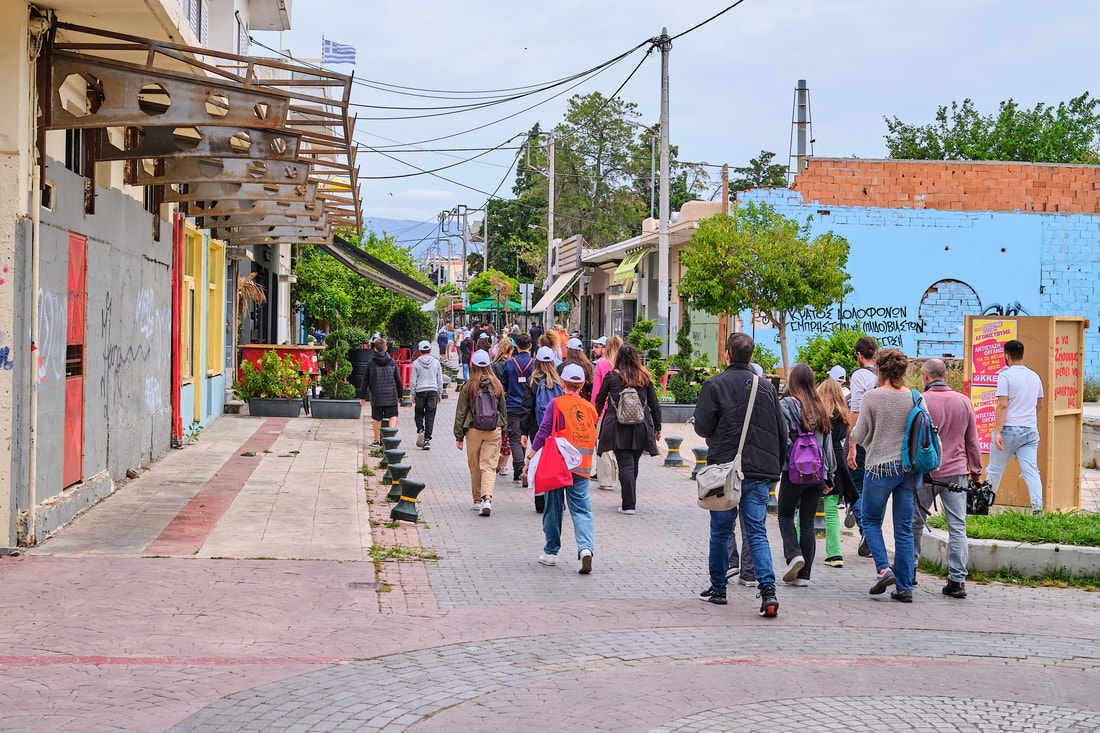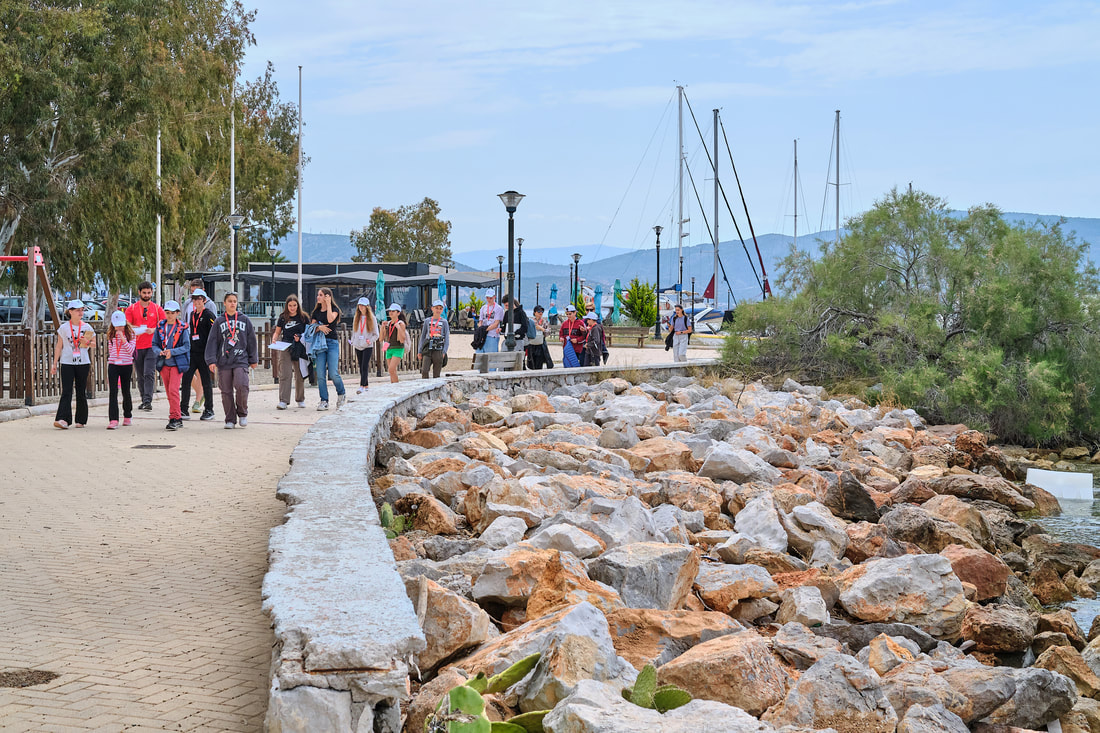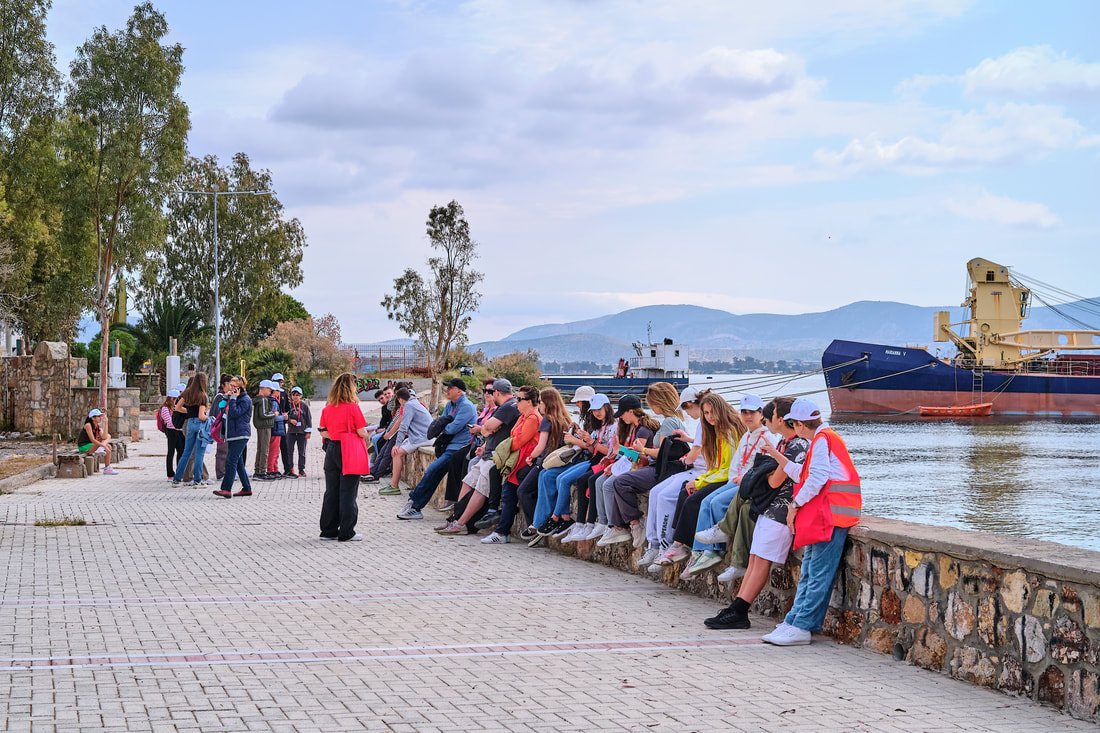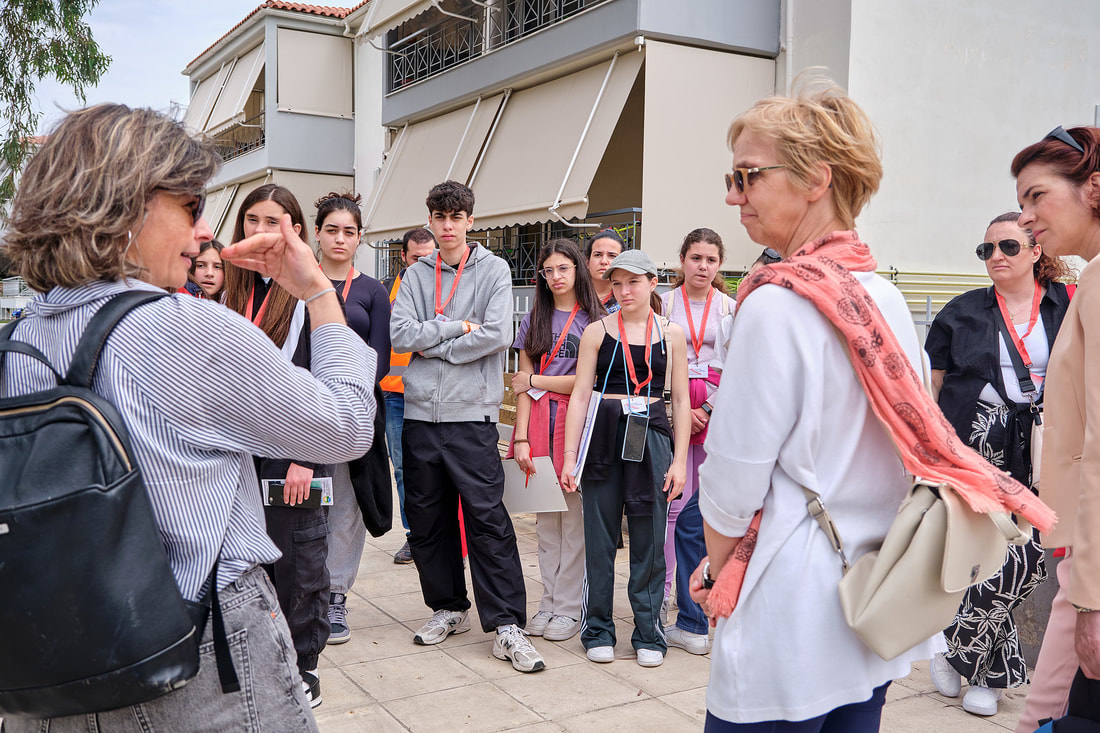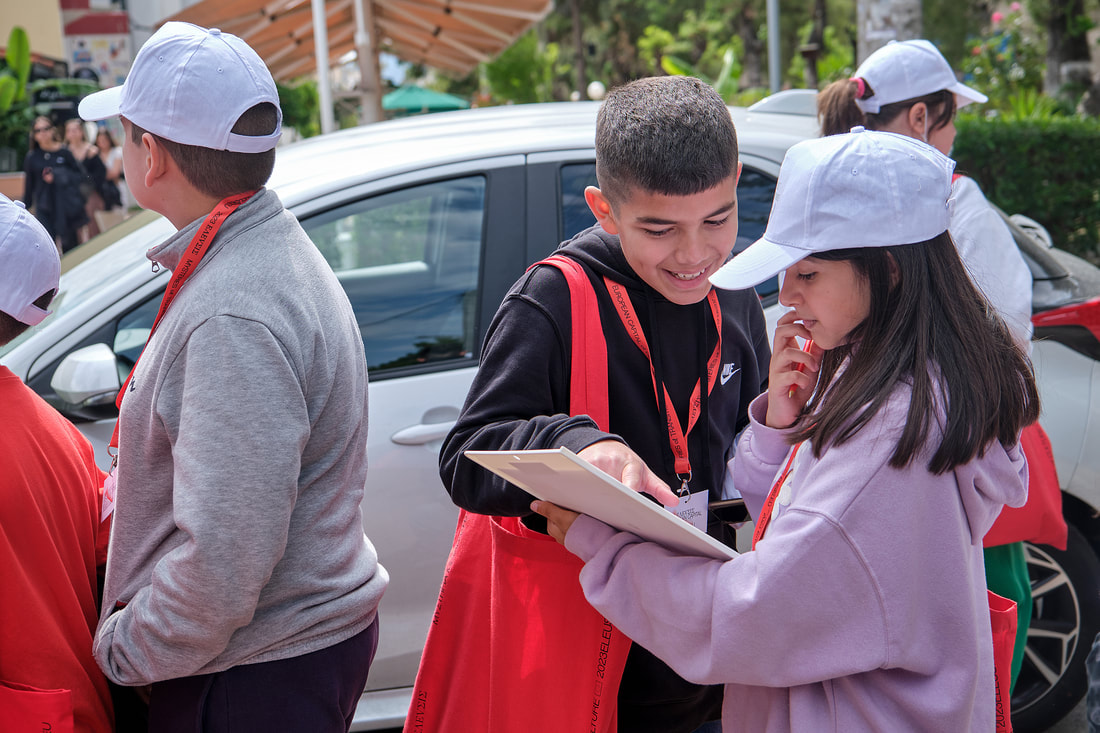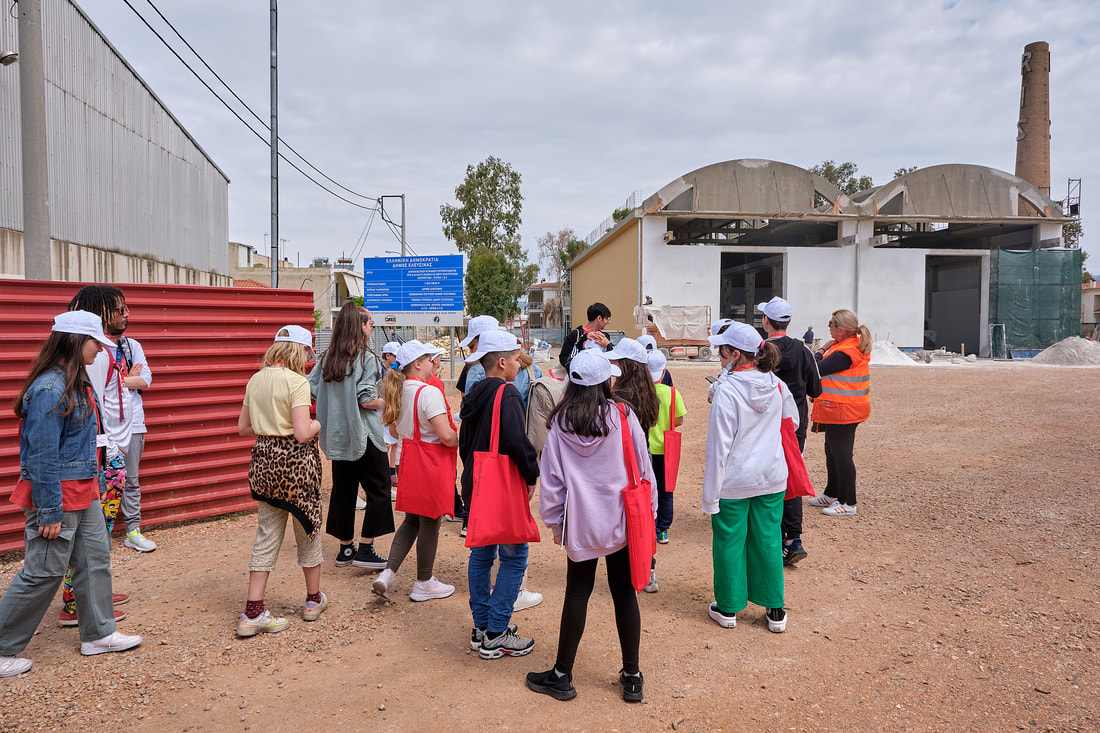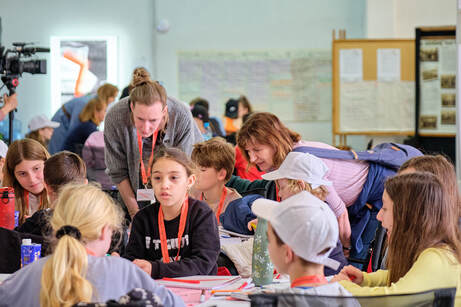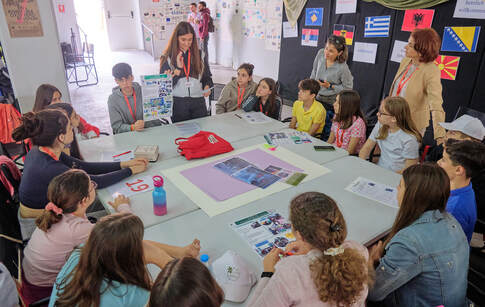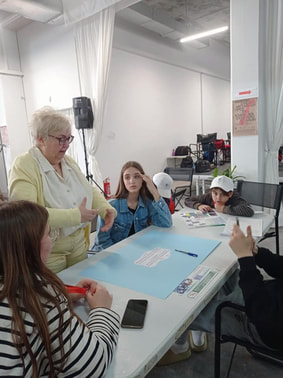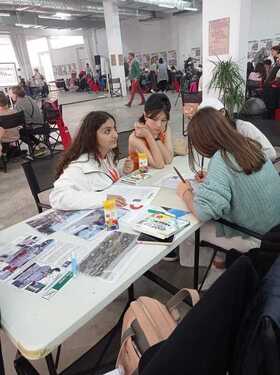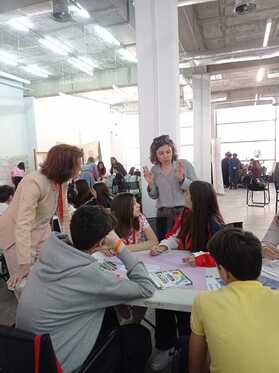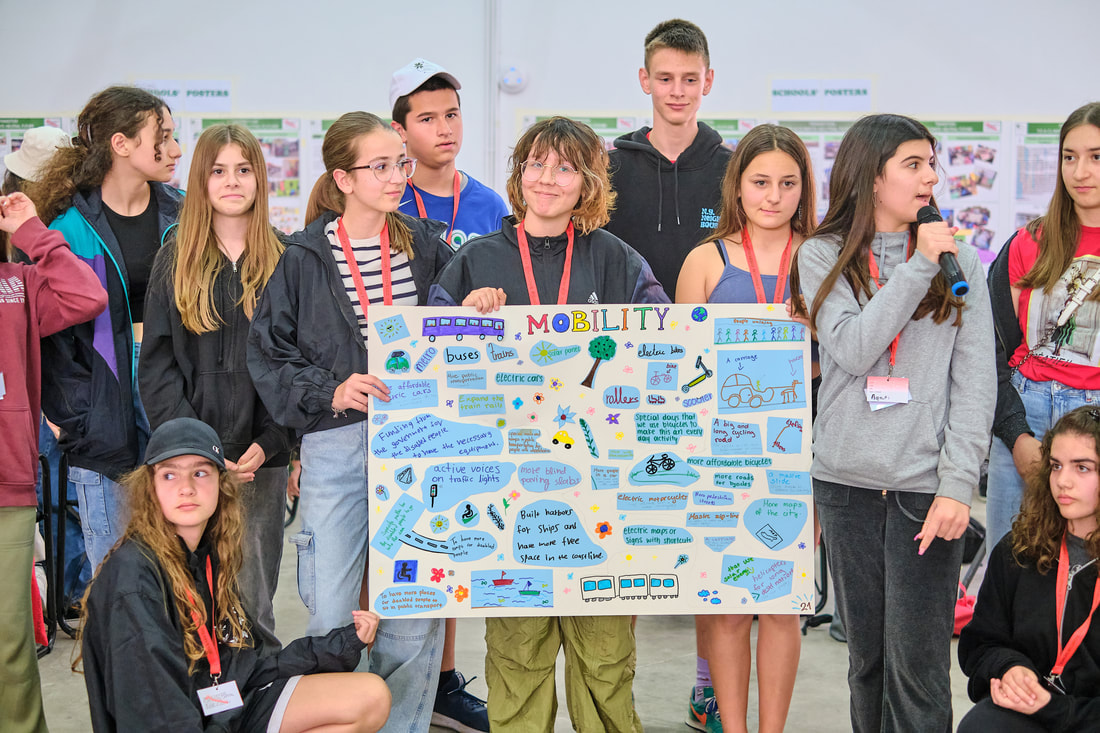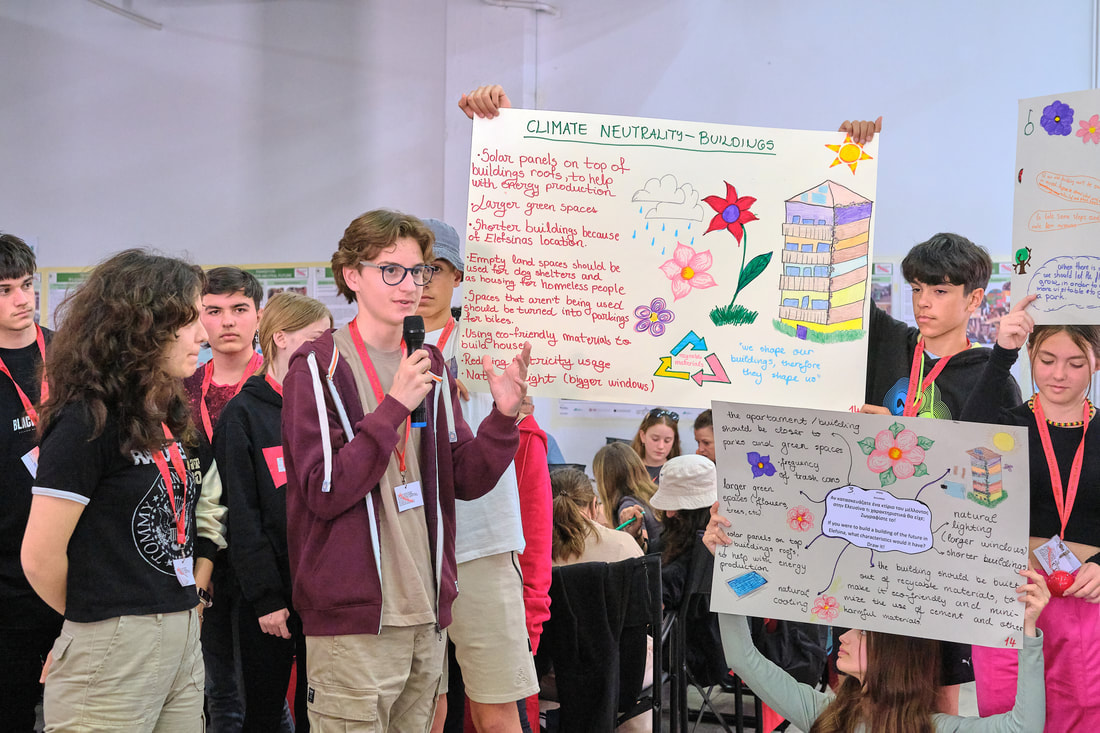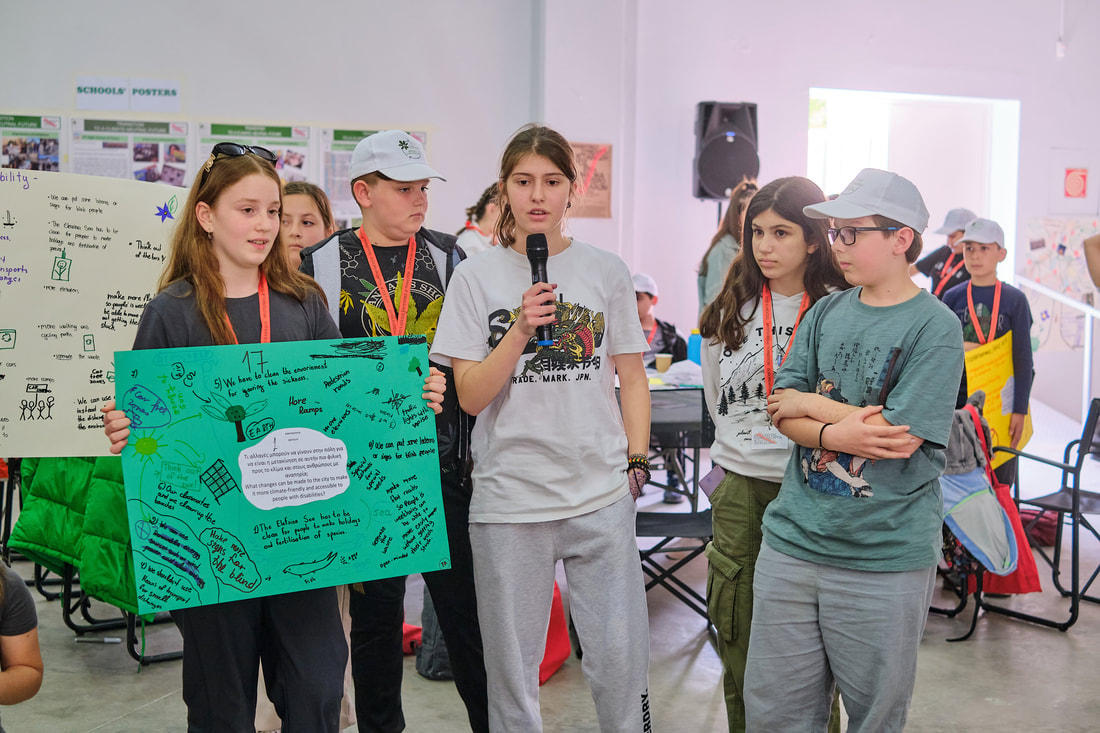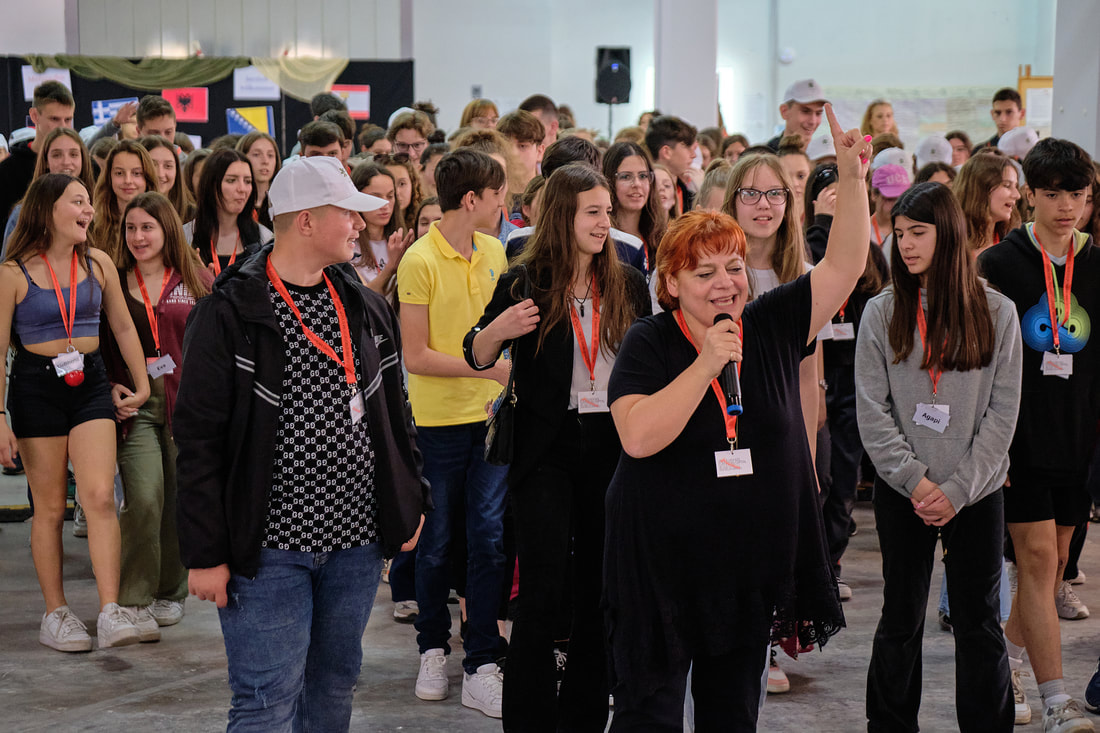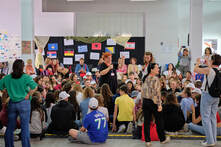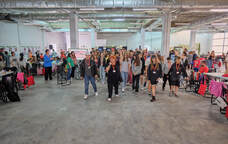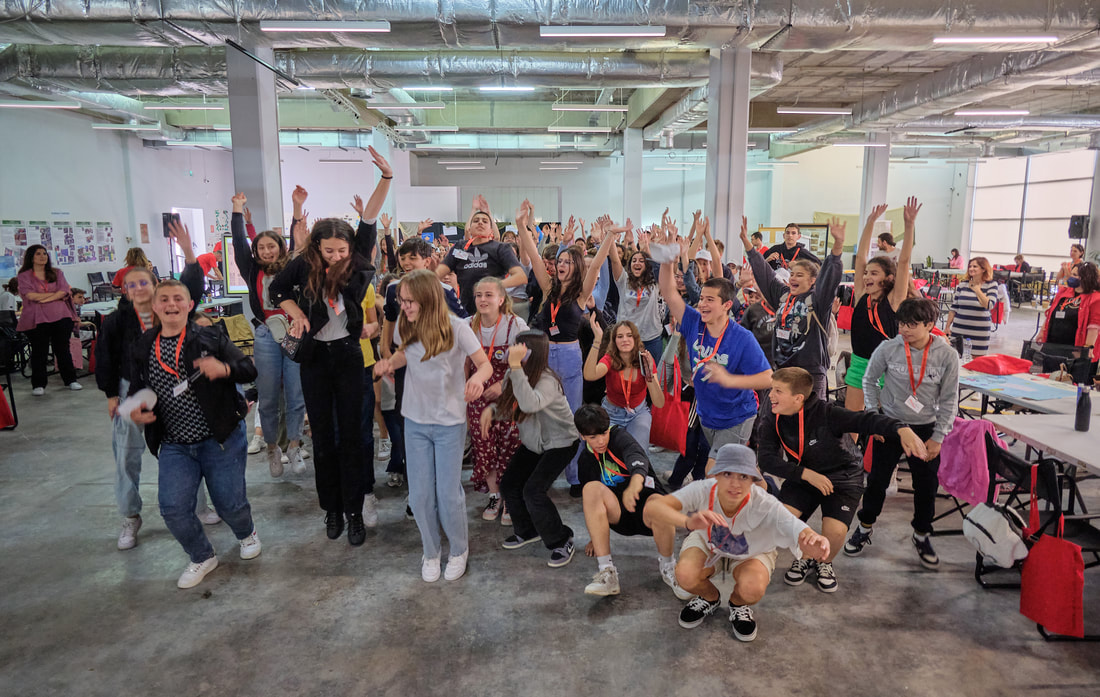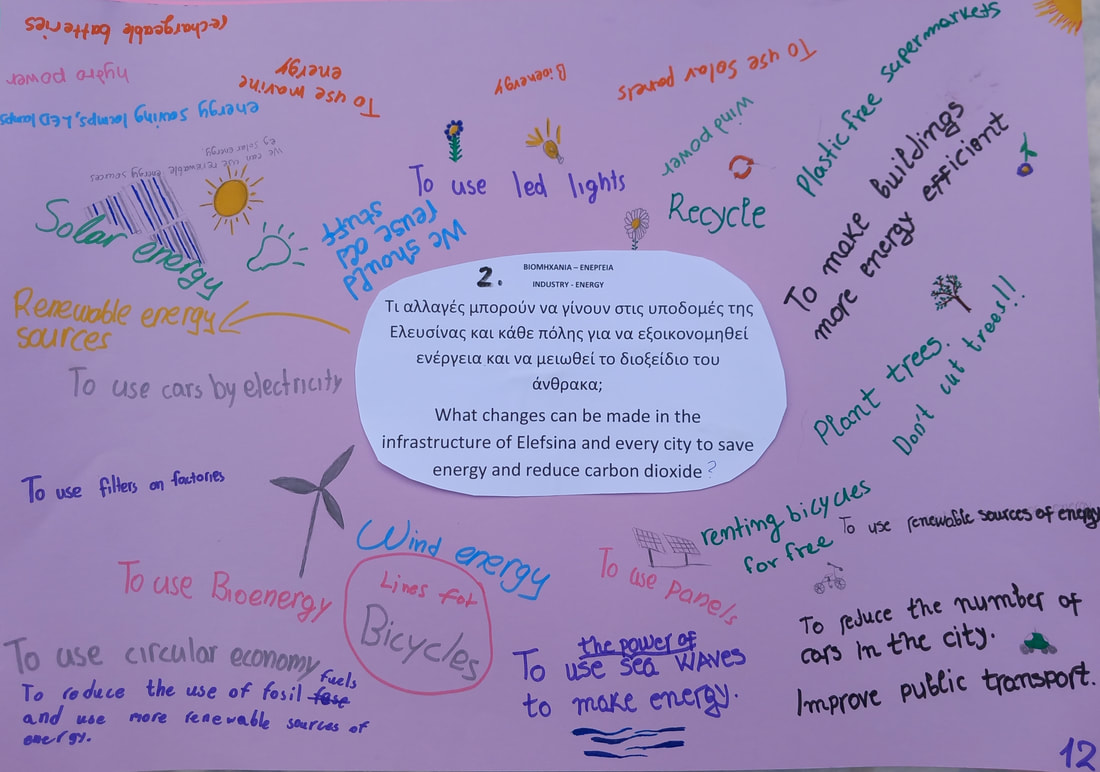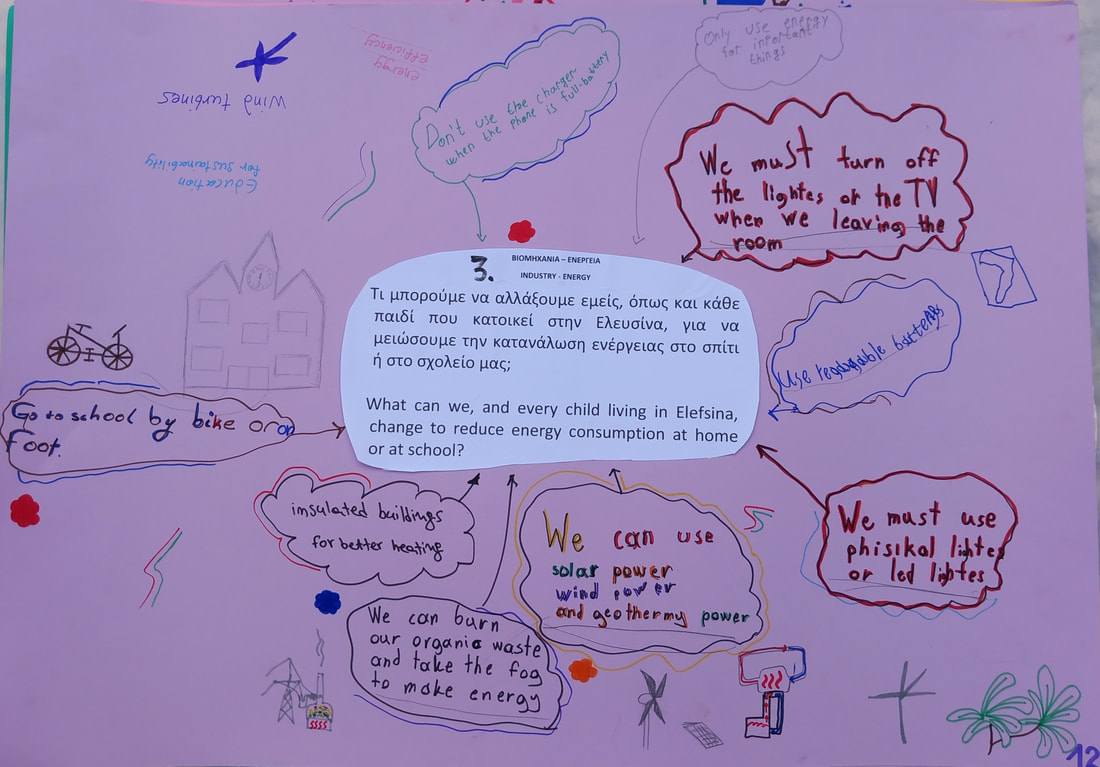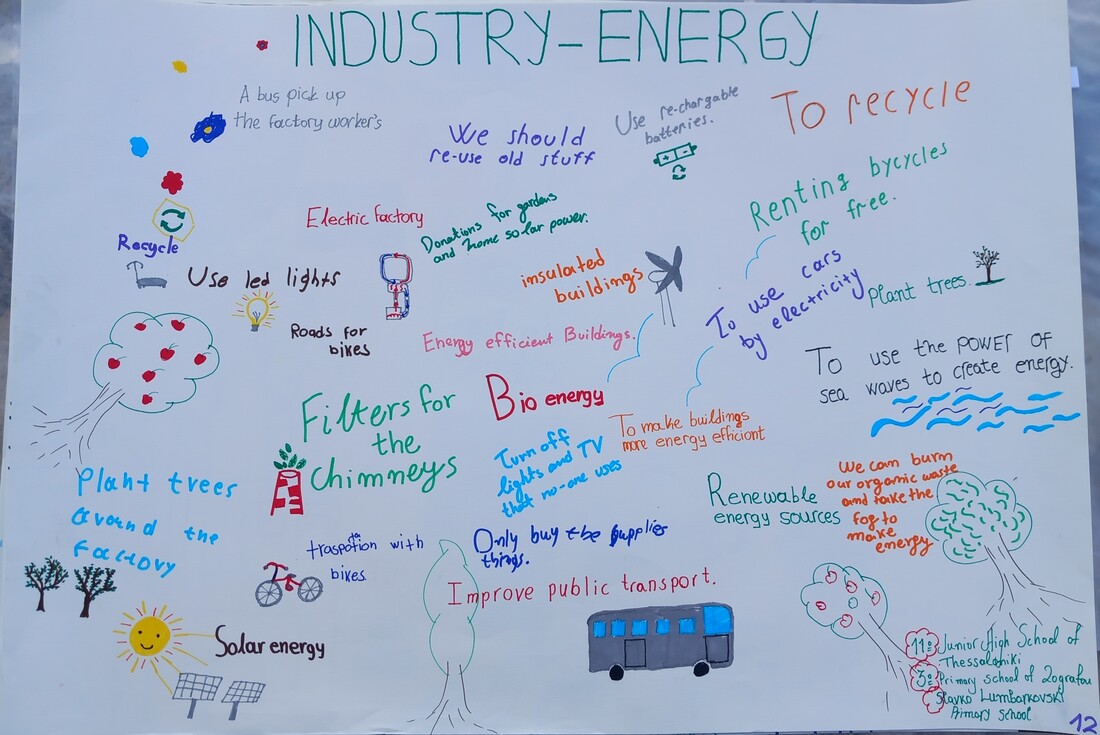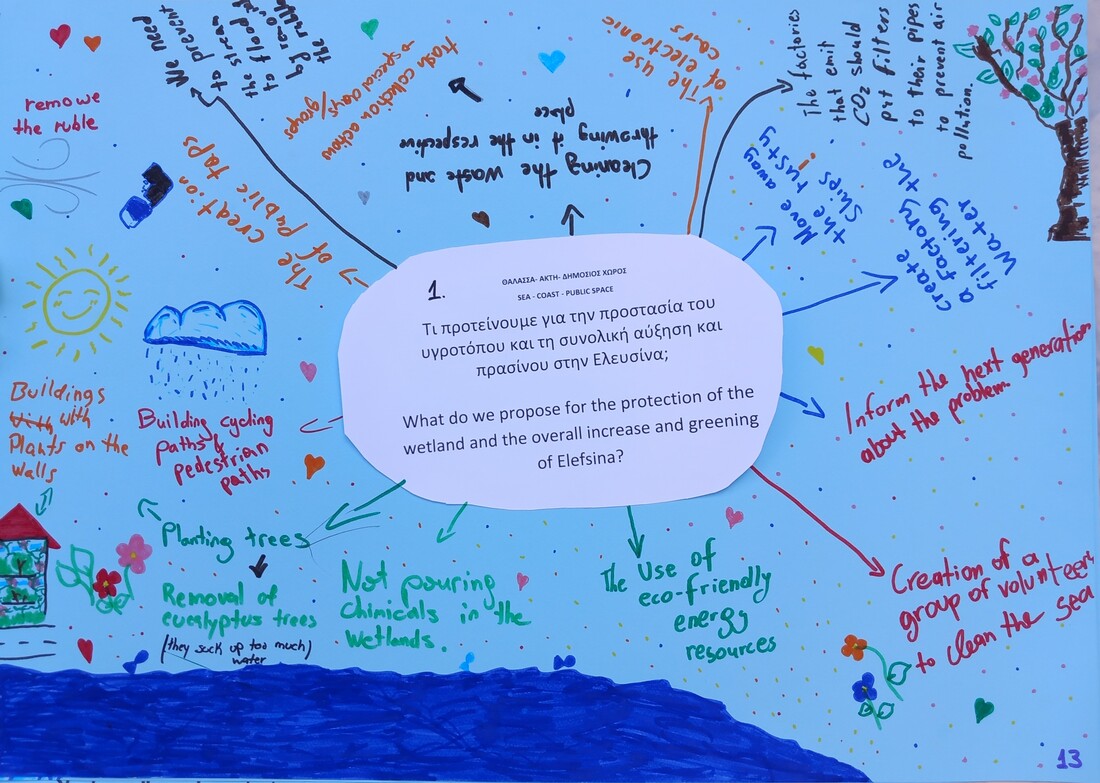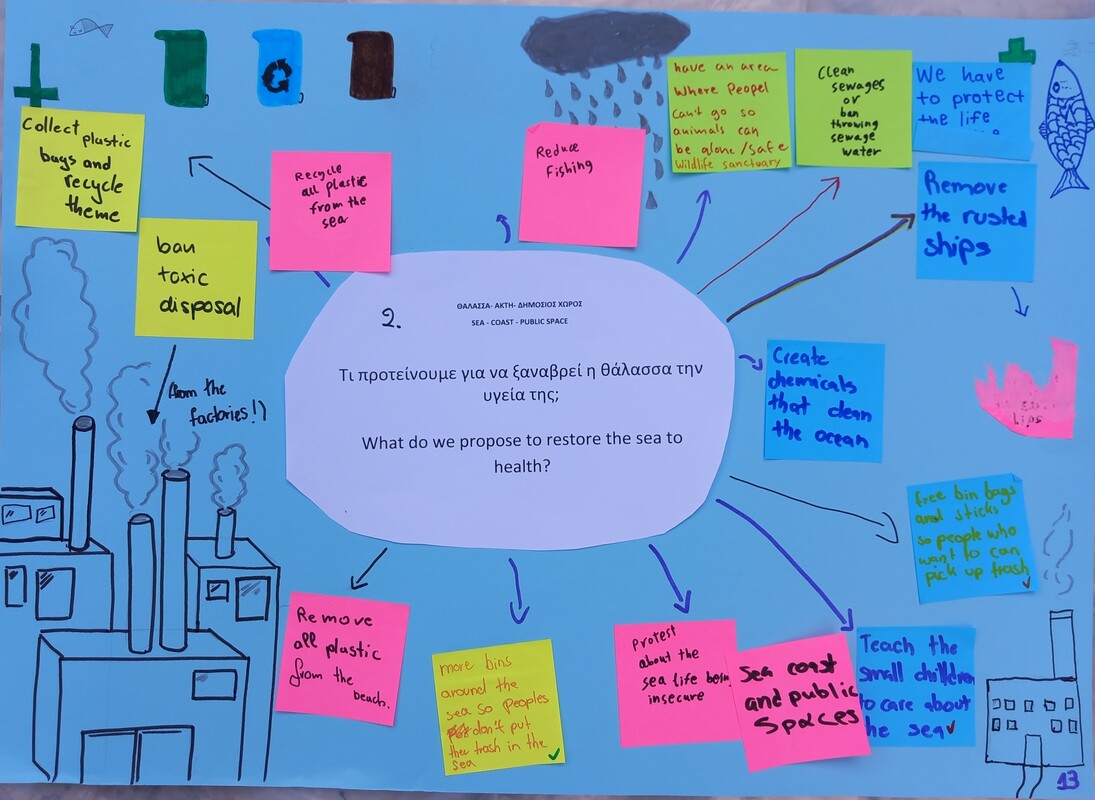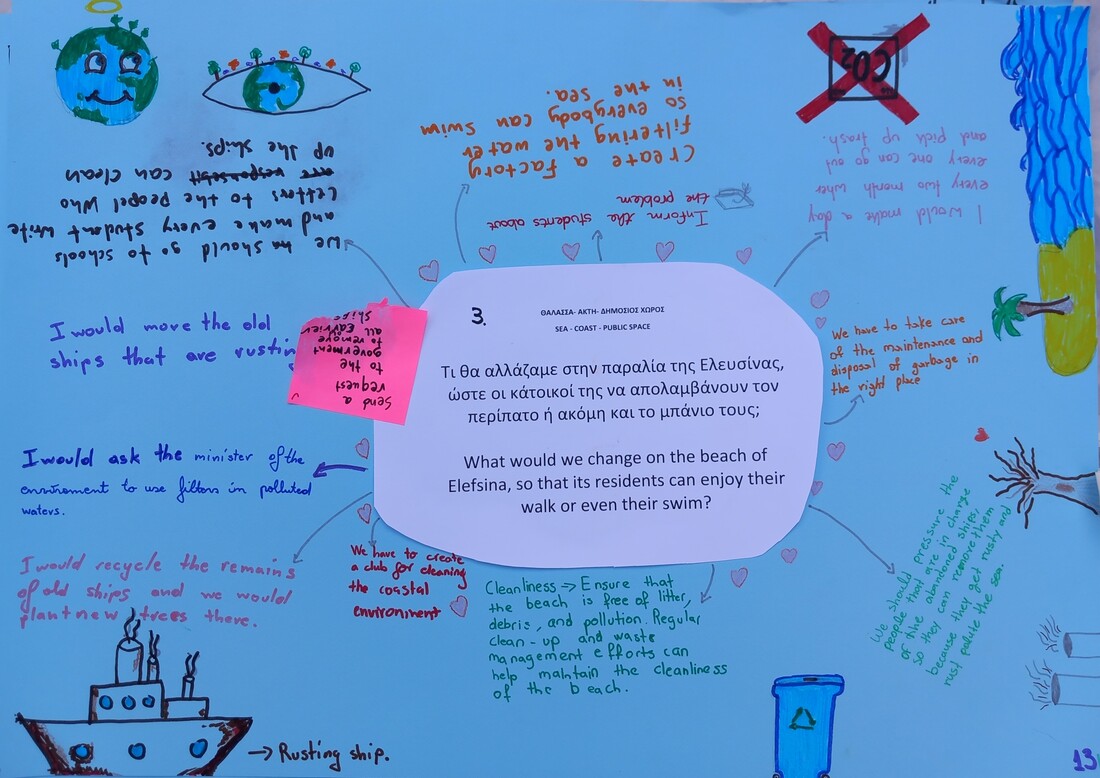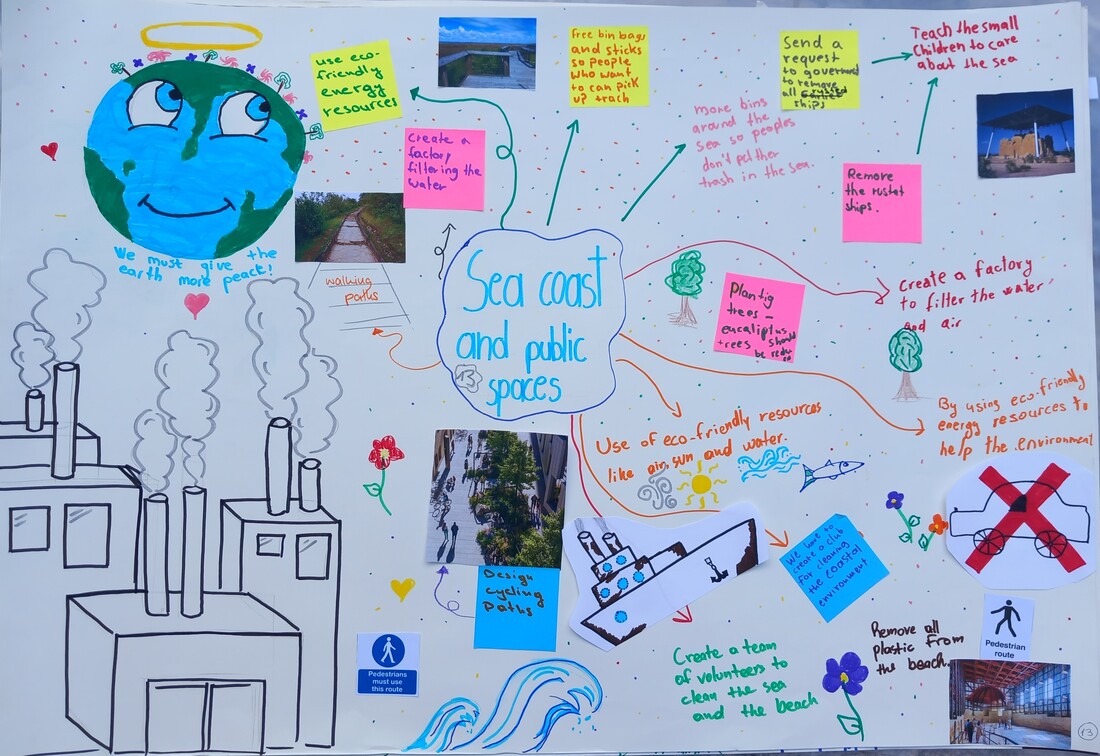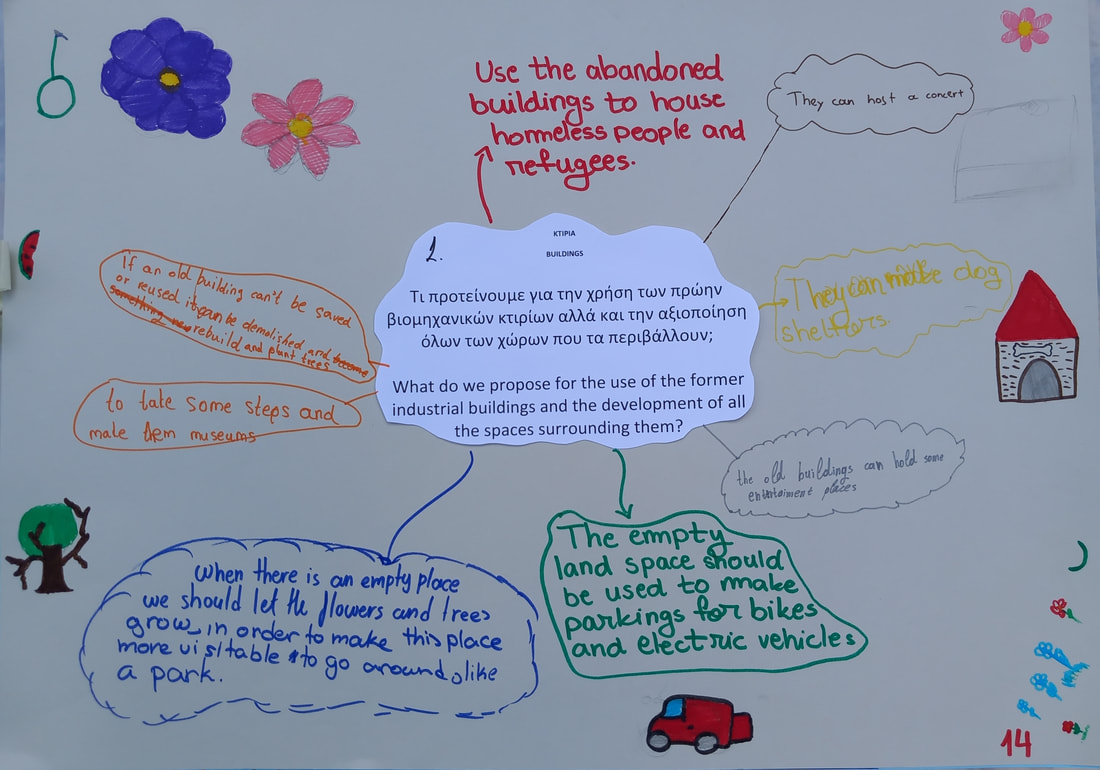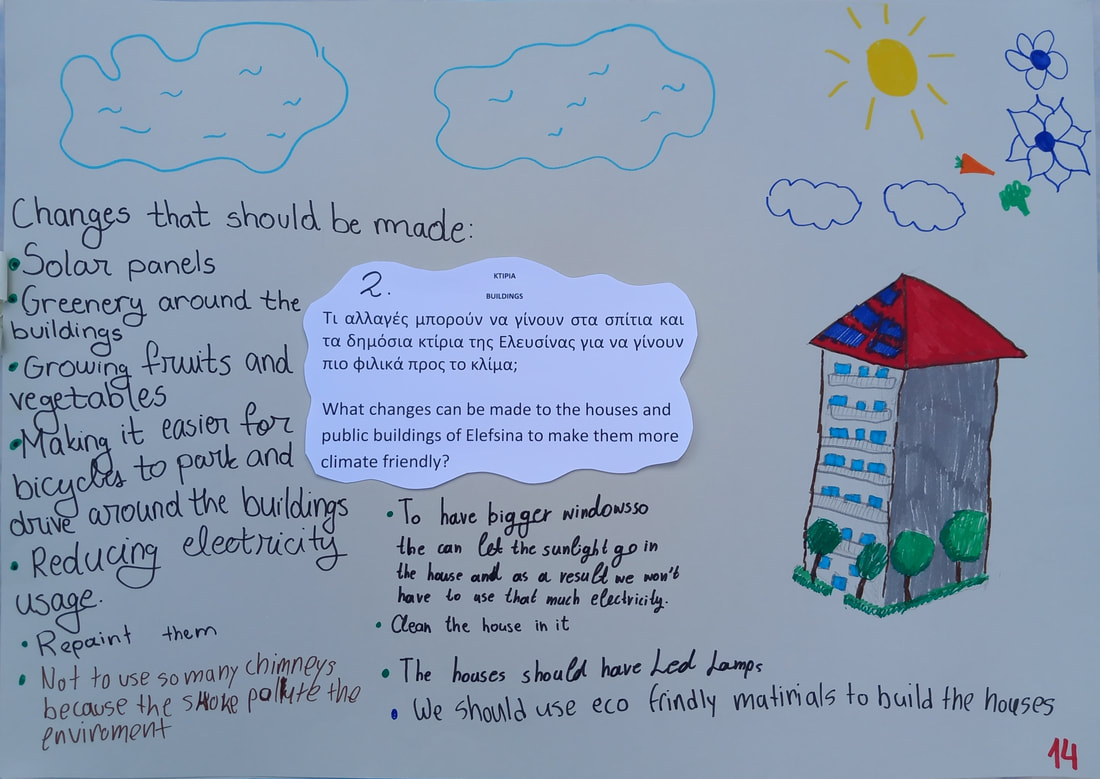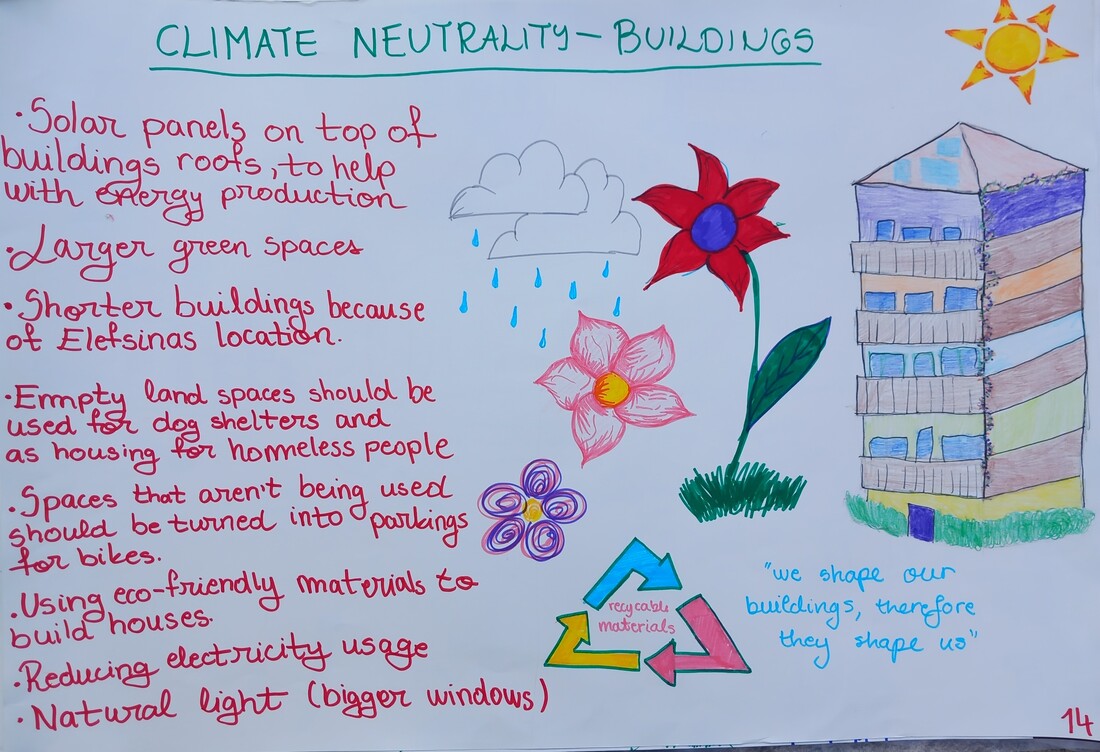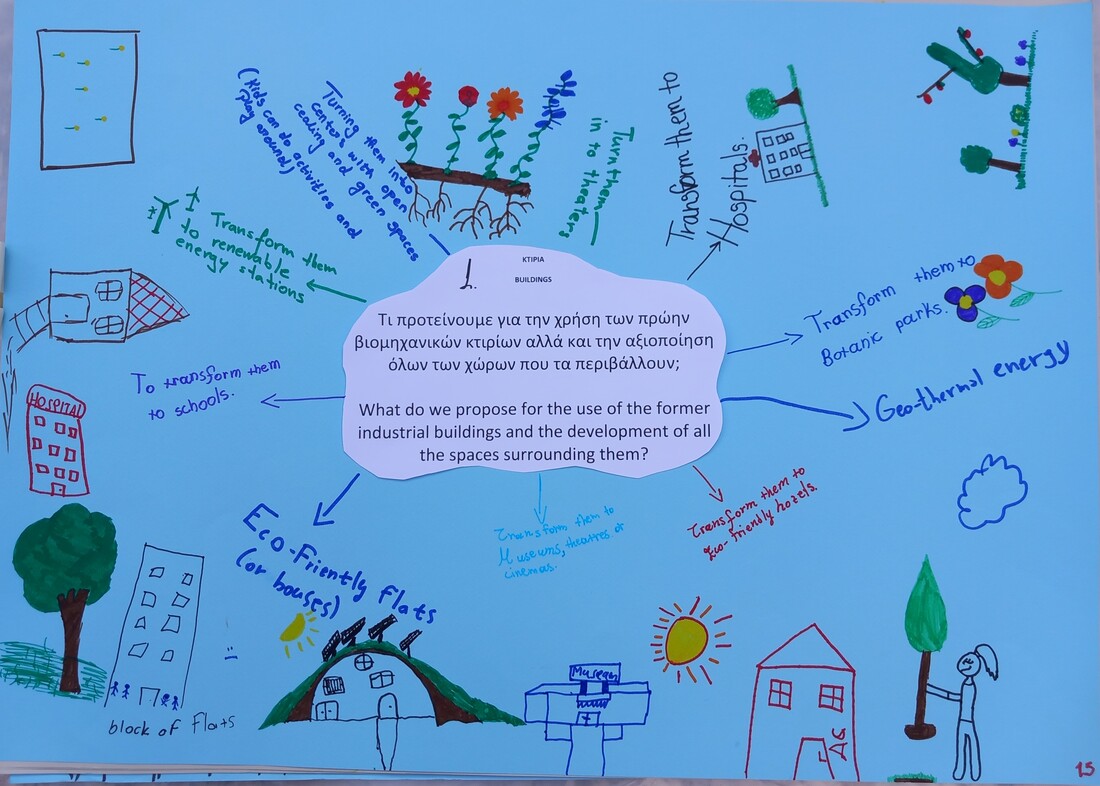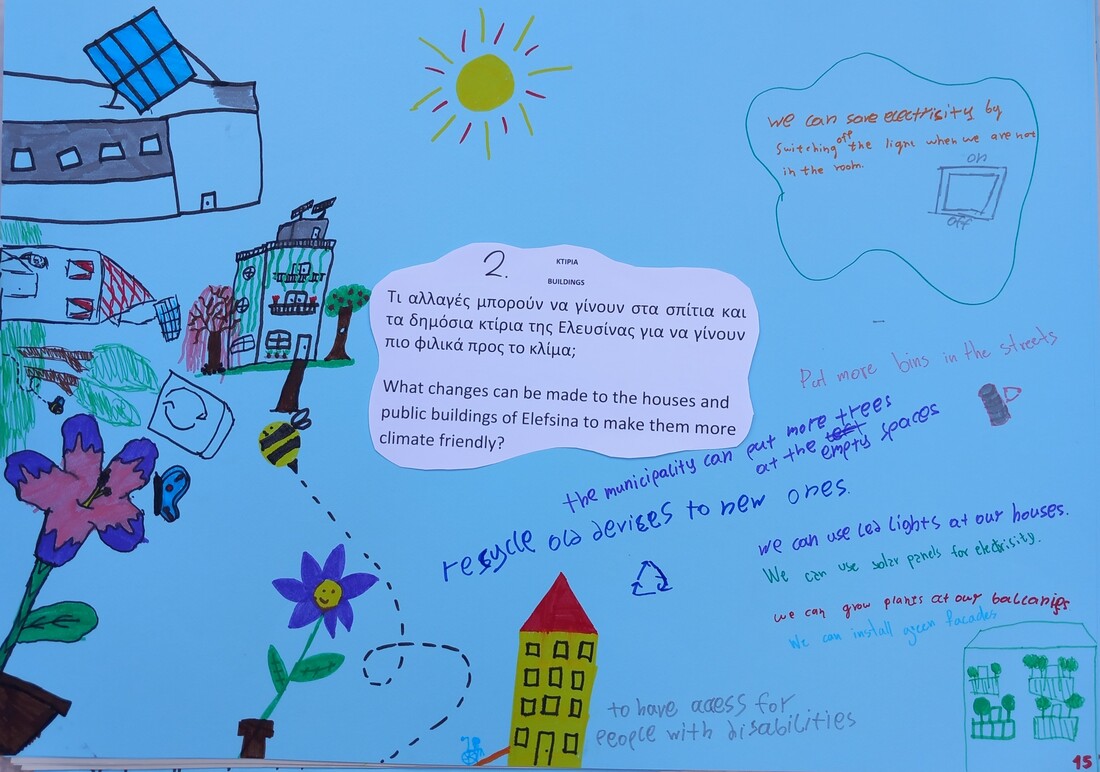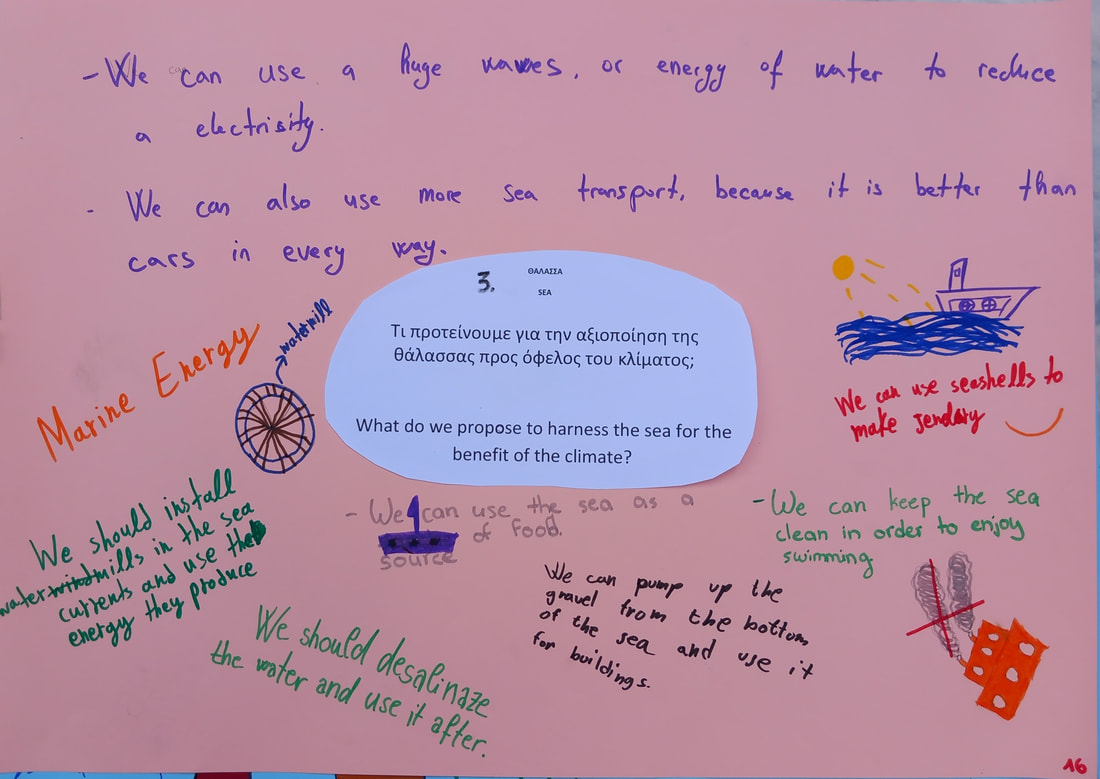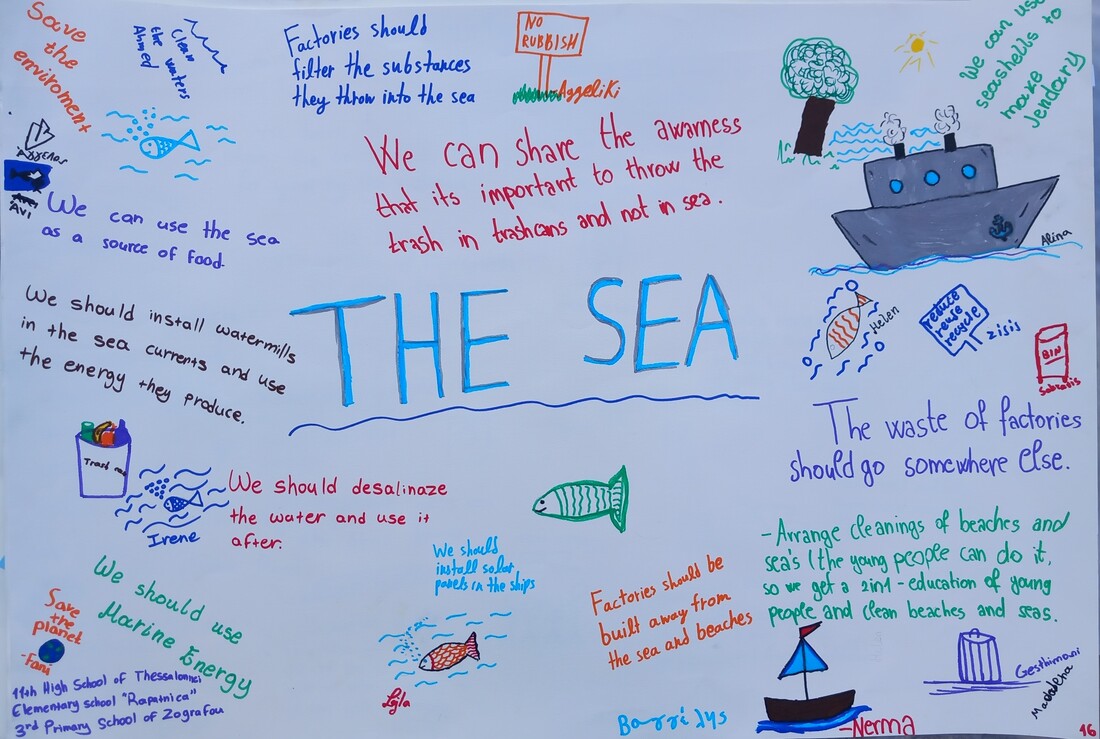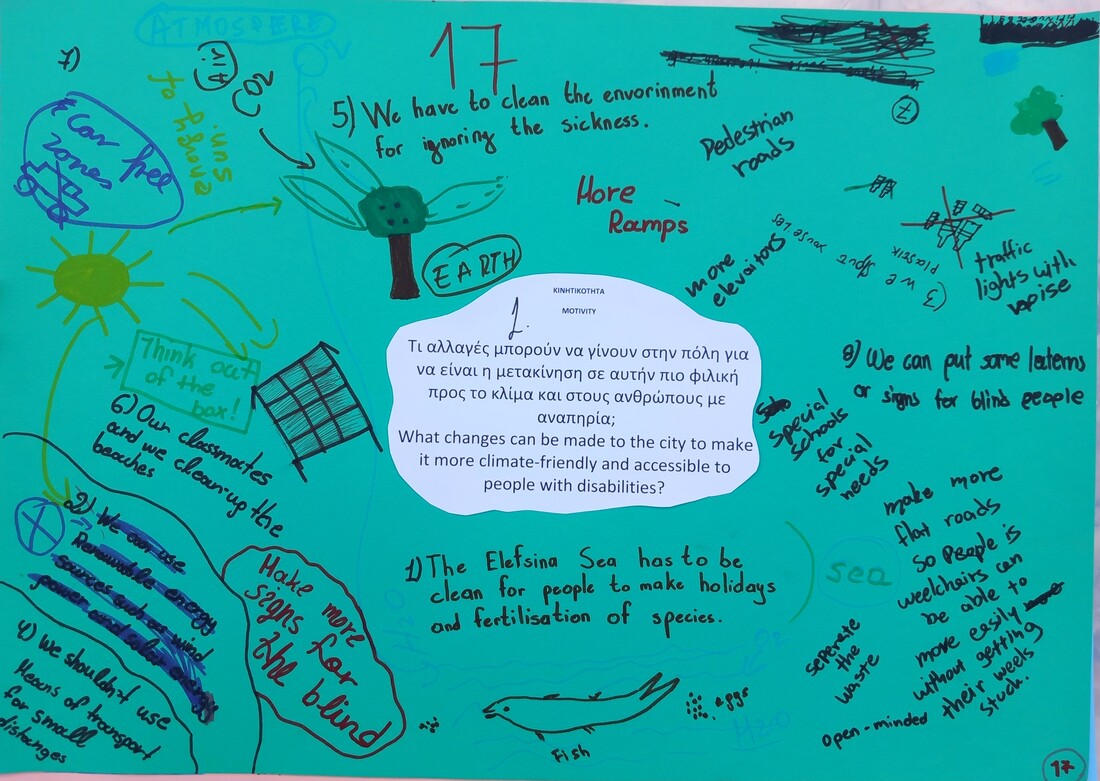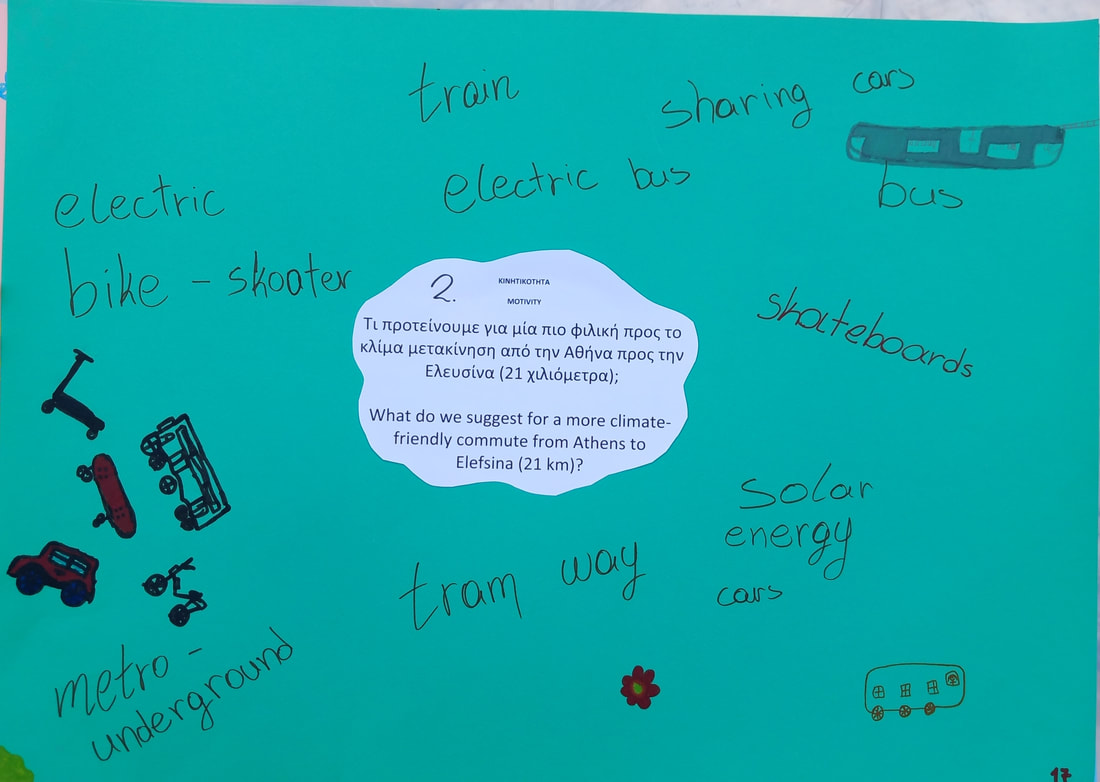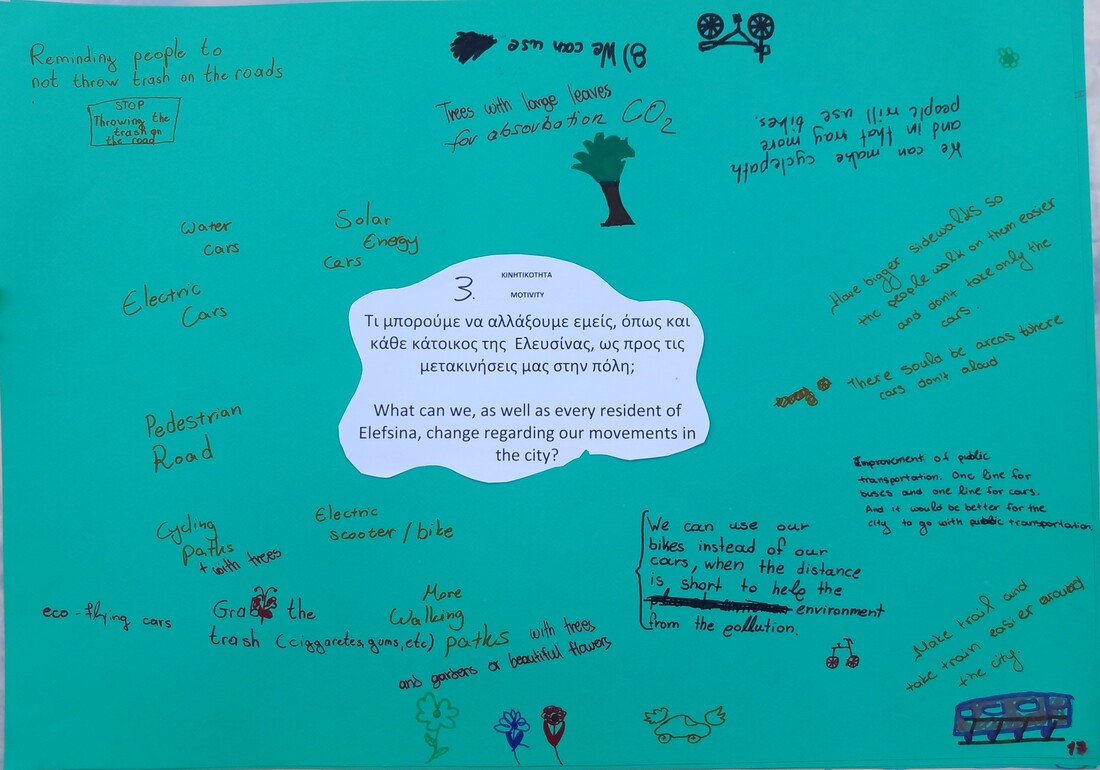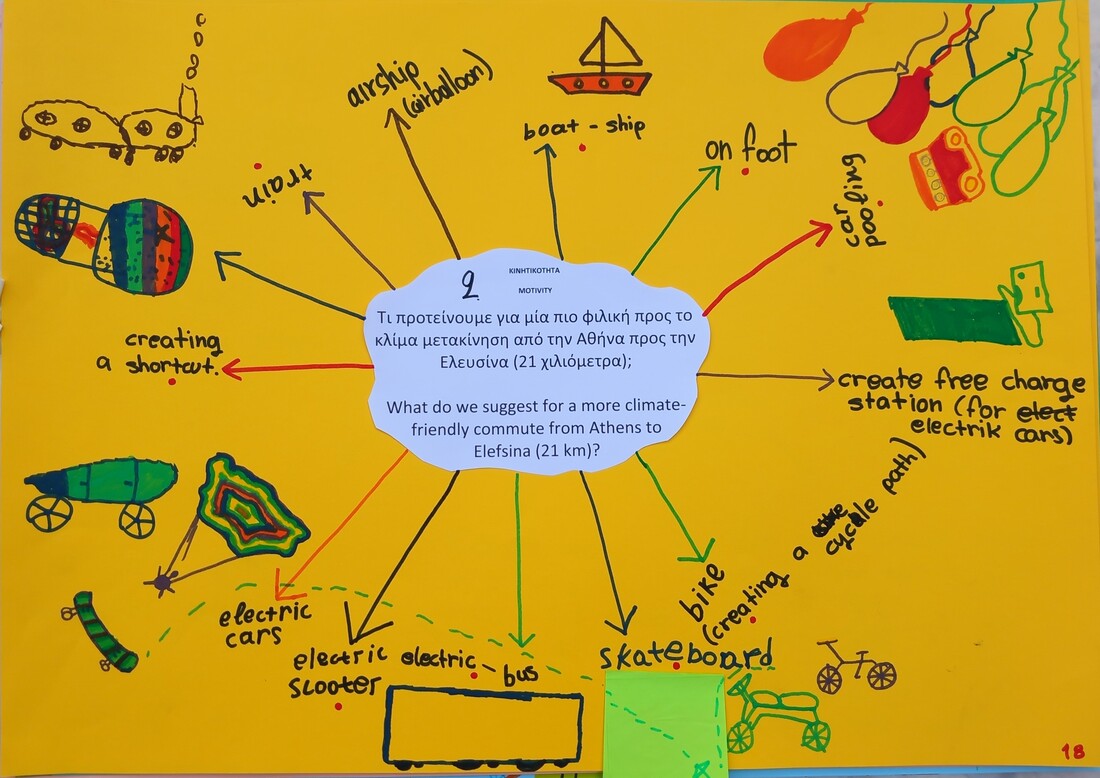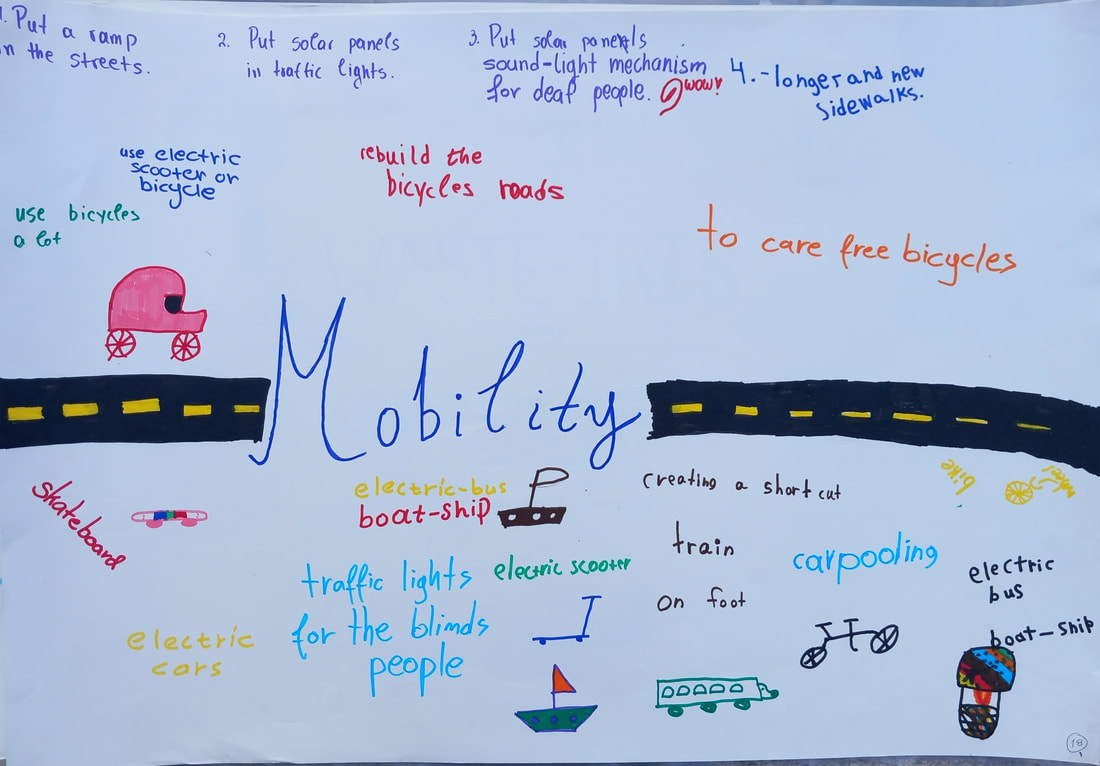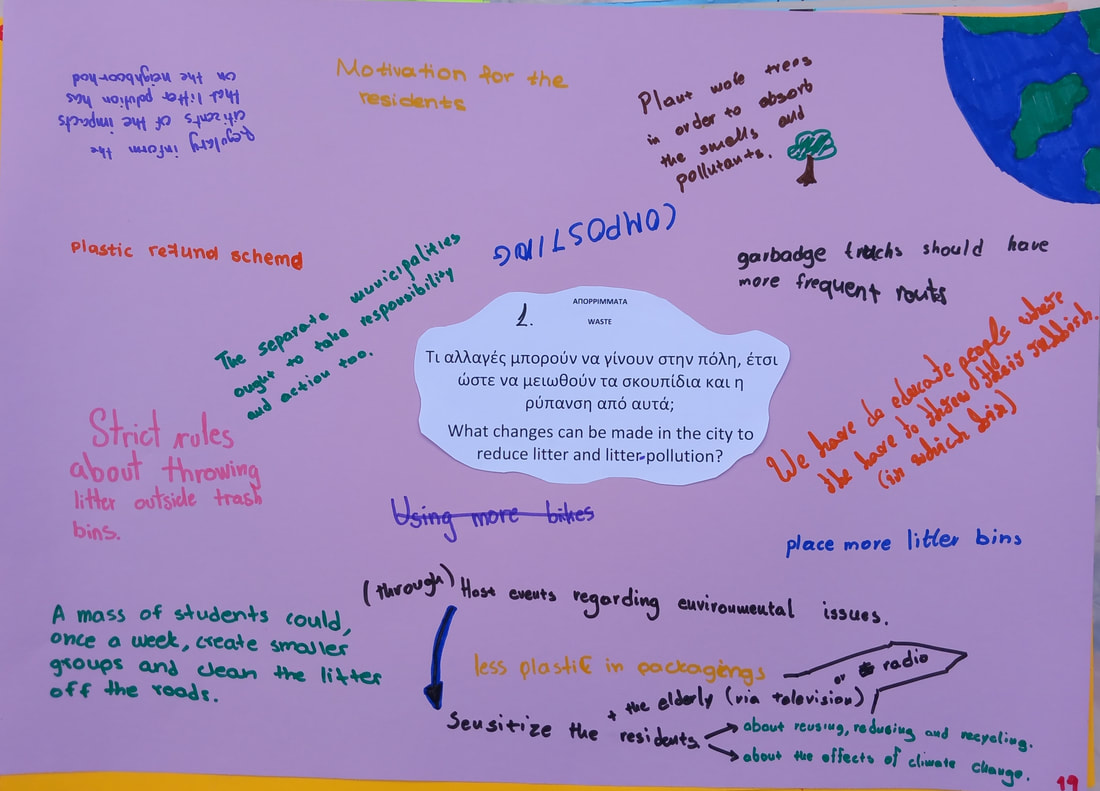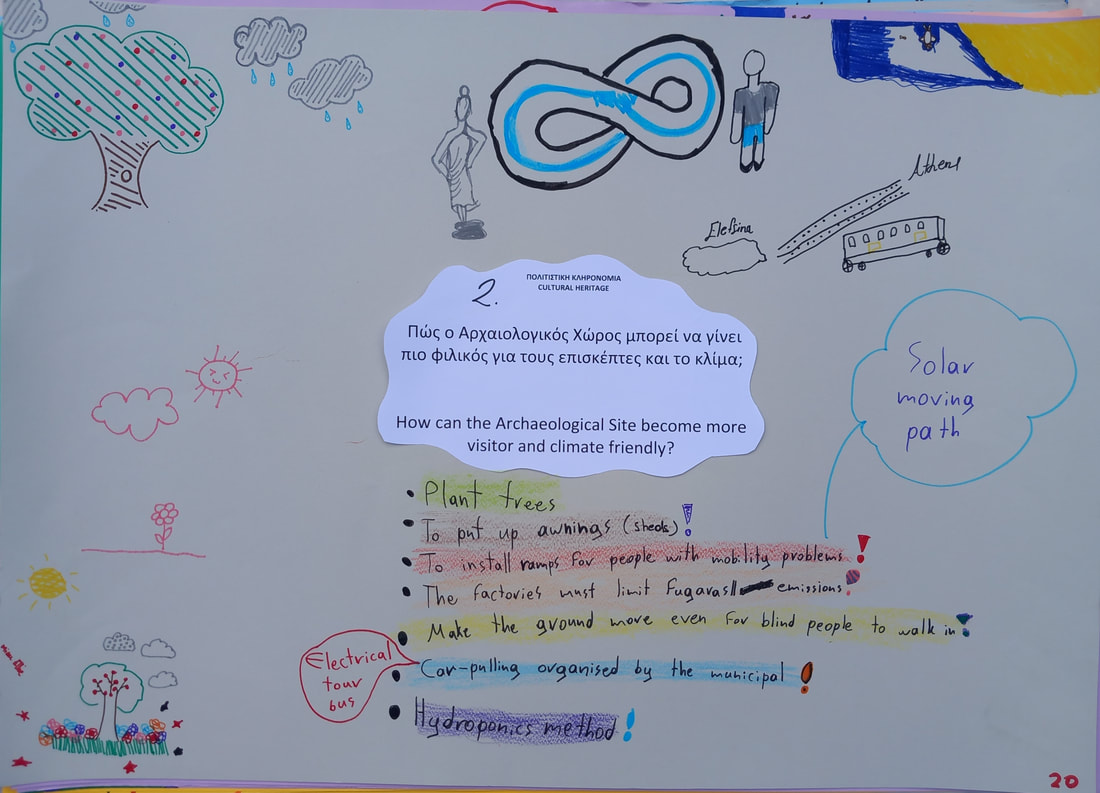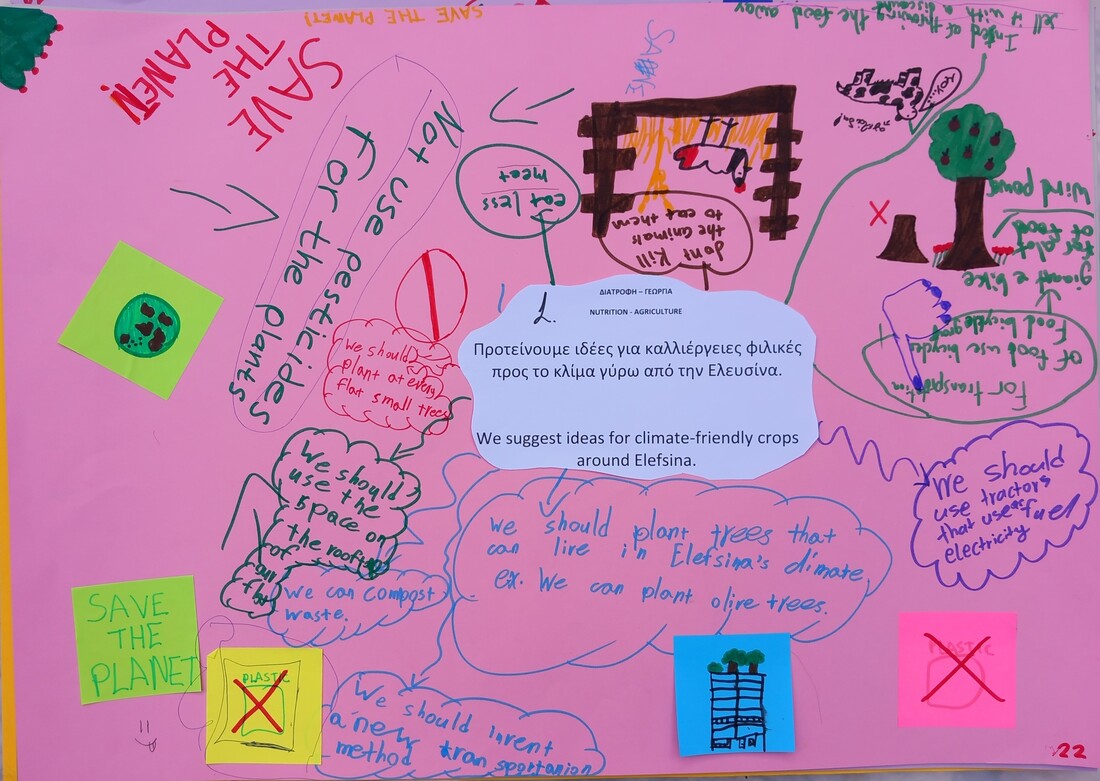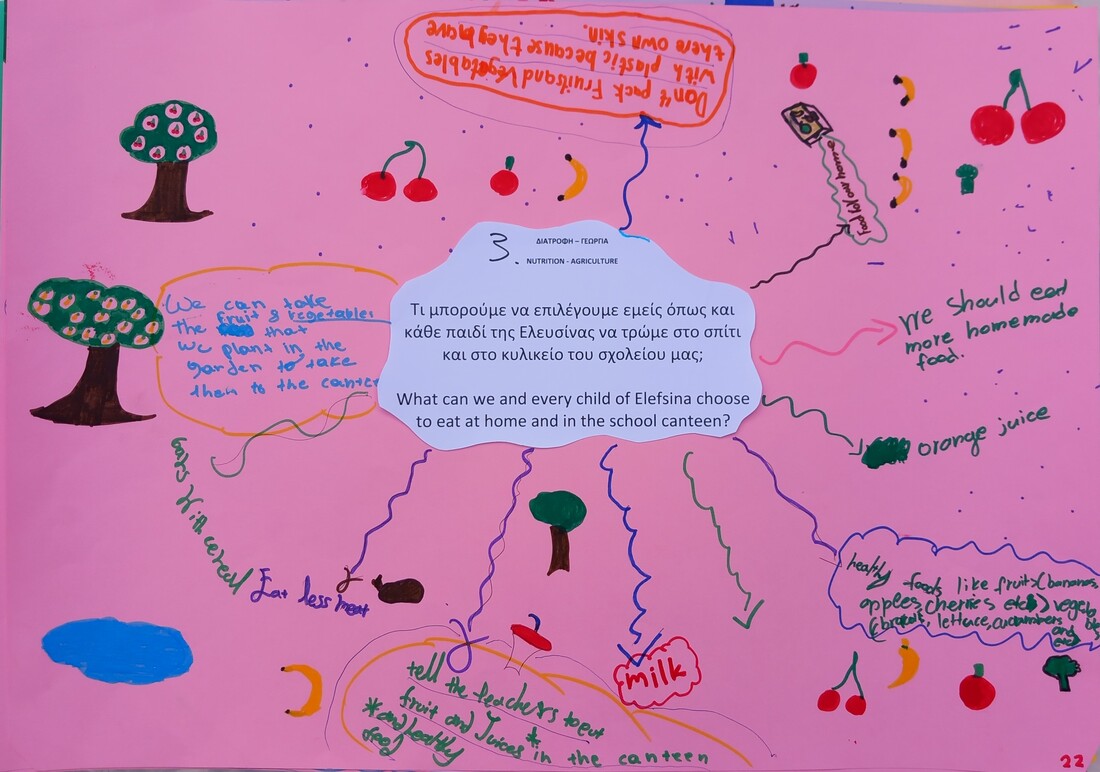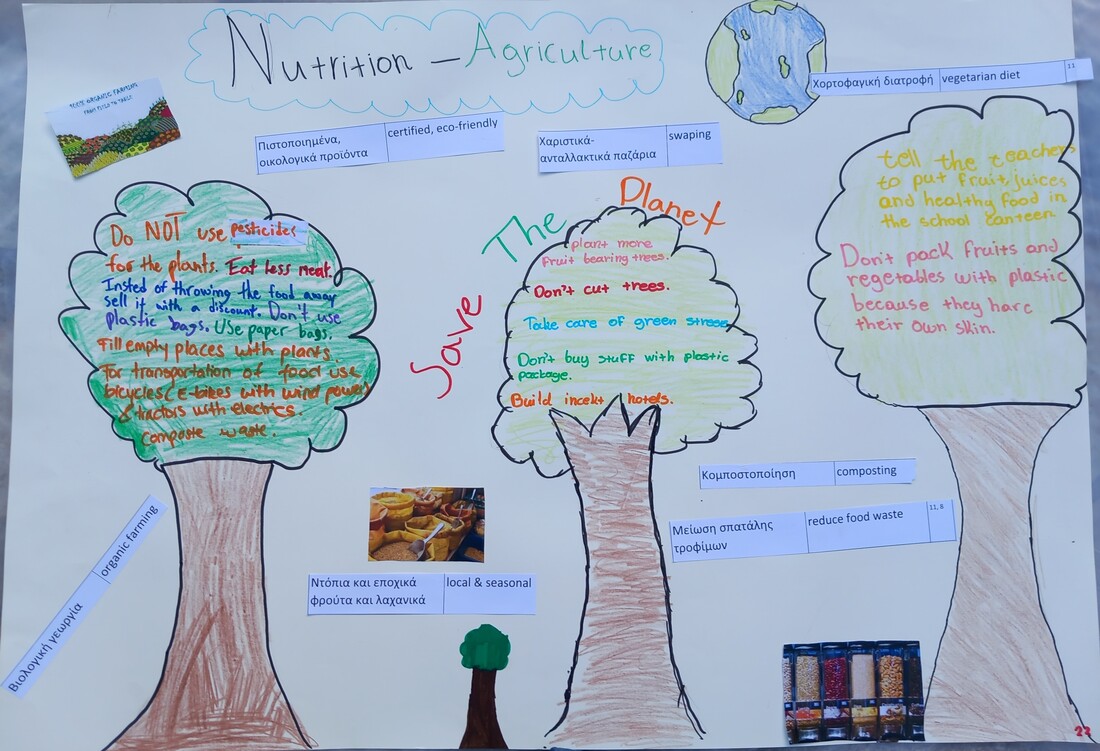The thematic Routes and the role of facilitators
Afterwards, the teams of the first day (schools of the first grade) started for the thematic routes while the teams of the second day (schools of the second grade and schools from Germany and the Western Balkans) left the X-Bowling to have a guided tour of the archaeological site and to meet with the Municipal Authority. To facilitate the groups on both the routes and the consultation, 12 young Eleusinian students were selected, who after being trained, accompanied the mixed groups on planned routes through the city and along the coastal front.
The four thematic routes and their objectives are as follows:
Α. VLYCHA route
The aim was to introduce the students to the coastal industrial zone of Elefsina (ELPE, TITAN) and the activities located there (SHIPWORKSHOP), to reflect on their green transformation, to get in touch with the natural landscape that resists heavy uses, to get to know the demands of the citizens for the rehabilitation of the coastal front, and to discover the relationship between all the above and the climate neutrality of Elefsina.
Β. CRONOS route
This route aimed a) to introduce students to the coastal industrial zone of Elefsina (KRONOS) and the port activities located there: Fishermen's port, commercial port, marina b) to raise awareness about the preservation of the industrial heritage and the contemporary challenges for the sustainable development of the place, c) to highlight the citizens' movements for the clean-up of the coastal front, d) the relation of all the above with the climate neutrality of Elefsina.
Γ. IRIS route
The aim of this route was to introduce the students to the urban fabric of the city, the types of housing, the uses and reuses of buildings, the former industrial buildings under renovation (IRIS), to raise awareness about the preservation of the industrial heritage and waste management, to reflect on sustainable mobility, and finally to discover the relationship of all the above with the climate neutrality of Elefsina.
D. Route ARCHAEOLOGICAL SPACE
This route aimed a) to introduce the students to the urban fabric of the city, its main pedestrian street (Nicolaidou Street), its Archaeological Site and the Museum, b) to raise awareness about the preservation of cultural heritage, sustainable mobility and sustainable nutrition, and finally c) to explore the relationship of all the above with the climate neutrality of Elefsina.
The four thematic routes and their objectives are as follows:
Α. VLYCHA route
The aim was to introduce the students to the coastal industrial zone of Elefsina (ELPE, TITAN) and the activities located there (SHIPWORKSHOP), to reflect on their green transformation, to get in touch with the natural landscape that resists heavy uses, to get to know the demands of the citizens for the rehabilitation of the coastal front, and to discover the relationship between all the above and the climate neutrality of Elefsina.
Β. CRONOS route
This route aimed a) to introduce students to the coastal industrial zone of Elefsina (KRONOS) and the port activities located there: Fishermen's port, commercial port, marina b) to raise awareness about the preservation of the industrial heritage and the contemporary challenges for the sustainable development of the place, c) to highlight the citizens' movements for the clean-up of the coastal front, d) the relation of all the above with the climate neutrality of Elefsina.
Γ. IRIS route
The aim of this route was to introduce the students to the urban fabric of the city, the types of housing, the uses and reuses of buildings, the former industrial buildings under renovation (IRIS), to raise awareness about the preservation of the industrial heritage and waste management, to reflect on sustainable mobility, and finally to discover the relationship of all the above with the climate neutrality of Elefsina.
D. Route ARCHAEOLOGICAL SPACE
This route aimed a) to introduce the students to the urban fabric of the city, its main pedestrian street (Nicolaidou Street), its Archaeological Site and the Museum, b) to raise awareness about the preservation of cultural heritage, sustainable mobility and sustainable nutrition, and finally c) to explore the relationship of all the above with the climate neutrality of Elefsina.
Pupils' consultation in round tables and the role of experts
The pupil groups, after the thematic routes to Vlychas, Kronos, Iris and the Archaeological site, ended up at the X-Bowling area in numbered tables in order to participate in a structured discussion using the worldcafé method.The round tables of 15-18 pupils from different schools were supported by the facilitator who had accompanied the group on the thematic route, the accompanying teachers and the experts.
The methodology by which the pupils worked in the thematic groups was the World Café methodology with the division of the groups into 3-4 round tables. During the work the students could address the expert to solve their questions about their topic or to communicate relevant suggestions they had thought of as possible solutions.
The methodology by which the pupils worked in the thematic groups was the World Café methodology with the division of the groups into 3-4 round tables. During the work the students could address the expert to solve their questions about their topic or to communicate relevant suggestions they had thought of as possible solutions.
Themes of consultation
The topics that the students worked on in the round tables were the following:
1. Thematic section INDUSTRY ENERGY/ (experts G.Pavlopoulos and Cindy Prager), groups 1,12, thematic route Vlycha
The groups examined the topic of energy in relation to its production and use, alternative sources and conservation and looked for solutions to transform the local industry and the city in general towards a climate neutral Elefsina.
2. Thematic section on THALAS-ACT-PUBLIC SPACE/experts P.Piliouras, A.Dardioti. E.Niarchou , groups 2,13 ,thematic route Vlycha
The groups addressed the issue of the sea and the wetland, their protection as ecosystems for CO2 absorption and the return of the coastal front to the inhabitants, with the aim of environmental regeneration of the area, mitigation and adaptation to climate change and improvement of the quality of life of the inhabitants.
3. Thematic section BUILDINGS /expert Evi Tzanakaki , groups 3,4,14,15, thematic routes Vlycha ,Kronos
The groups examined the issue of the utilization of abandoned and reused industrial and other public and private buildings and their surroundings, through integrated or spot interventions and in an energy efficient and architecturally sustainable way, with the aim of highlighting the history of the place and the preservation of historical memory in a climate-neutral course of the city.
4. Thematic unit SEA / Expert M.Demopoulou ,groups 5,16 , thematic route Kronos
The groups dealt with the theme of the sea, its protection as an ecosystem for CO2 absorption, the green transformation of its ports and maritime transport and the return of the coastal front to the inhabitants, with the aim of upgrading the quality of life and the transition to climate neutrality.
5. MOBILITY theme /Expert Liaskos ,Groups 6,7,10,17,18,21,Thematic routes Kronos ,Iris ,Archaeological site
The groups explored all the issues of sustainable urban mobility, both within the city and in its connection with Athens and Piraeus, with the aim of facilitating the lives of residents and visitors in climate-neutral ways
6.Thematic unit WASTE /Experts (Iro Alabei , Kerkez, groups 8,19, thematic route Iris)
The groups dealt with sustainable waste management (reduction - reuse - recycling) and the city's infrastructure that serves it, with the aim of Elefsina's transition to climate neutrality.
7.Thematic section CULTURAL HERITAGE/Experts Alexandra Tsigkou, 9,20, thematic route Archaeological Site
The groups examined the archaeological site of Elefsina as cultural heritage and as a public space, its protection from climate change and pressures from tourism and the universal connection between the past and the future in the direction of climate neutrality in a local and global historical context.
8.Thematic unit NUTRITION - AGRICULTURE/Experts Sylvie Ioakimidou , Muriel.Neugebauer -UFU ,groups 11,21, thematic route Archaeological site.
The groups discussed the topic of sustainable food and local food production, with the aim of transitioning Elefsina to climate neutrality.
1. Thematic section INDUSTRY ENERGY/ (experts G.Pavlopoulos and Cindy Prager), groups 1,12, thematic route Vlycha
The groups examined the topic of energy in relation to its production and use, alternative sources and conservation and looked for solutions to transform the local industry and the city in general towards a climate neutral Elefsina.
2. Thematic section on THALAS-ACT-PUBLIC SPACE/experts P.Piliouras, A.Dardioti. E.Niarchou , groups 2,13 ,thematic route Vlycha
The groups addressed the issue of the sea and the wetland, their protection as ecosystems for CO2 absorption and the return of the coastal front to the inhabitants, with the aim of environmental regeneration of the area, mitigation and adaptation to climate change and improvement of the quality of life of the inhabitants.
3. Thematic section BUILDINGS /expert Evi Tzanakaki , groups 3,4,14,15, thematic routes Vlycha ,Kronos
The groups examined the issue of the utilization of abandoned and reused industrial and other public and private buildings and their surroundings, through integrated or spot interventions and in an energy efficient and architecturally sustainable way, with the aim of highlighting the history of the place and the preservation of historical memory in a climate-neutral course of the city.
4. Thematic unit SEA / Expert M.Demopoulou ,groups 5,16 , thematic route Kronos
The groups dealt with the theme of the sea, its protection as an ecosystem for CO2 absorption, the green transformation of its ports and maritime transport and the return of the coastal front to the inhabitants, with the aim of upgrading the quality of life and the transition to climate neutrality.
5. MOBILITY theme /Expert Liaskos ,Groups 6,7,10,17,18,21,Thematic routes Kronos ,Iris ,Archaeological site
The groups explored all the issues of sustainable urban mobility, both within the city and in its connection with Athens and Piraeus, with the aim of facilitating the lives of residents and visitors in climate-neutral ways
6.Thematic unit WASTE /Experts (Iro Alabei , Kerkez, groups 8,19, thematic route Iris)
The groups dealt with sustainable waste management (reduction - reuse - recycling) and the city's infrastructure that serves it, with the aim of Elefsina's transition to climate neutrality.
7.Thematic section CULTURAL HERITAGE/Experts Alexandra Tsigkou, 9,20, thematic route Archaeological Site
The groups examined the archaeological site of Elefsina as cultural heritage and as a public space, its protection from climate change and pressures from tourism and the universal connection between the past and the future in the direction of climate neutrality in a local and global historical context.
8.Thematic unit NUTRITION - AGRICULTURE/Experts Sylvie Ioakimidou , Muriel.Neugebauer -UFU ,groups 11,21, thematic route Archaeological site.
The groups discussed the topic of sustainable food and local food production, with the aim of transitioning Elefsina to climate neutrality.
Presentation of the proposals to the plenary session
Presentation of the proposals to the plenary session
Workshop closing activity (animator Sylvi Ioakeimidou)
Pupils' suggestions (working posters)
Website design - content and maintenance:
Pedagogical Team of the Conference (M. Dimopoulou - E. Niarchou - A. Tsigkou - A. Dardioti)
Pedagogical Team of the Conference (M. Dimopoulou - E. Niarchou - A. Tsigkou - A. Dardioti)


